Oral history with Audrey Smith
An oral history interview conducted with ? during Lakeland Heritage Weekend 2008.
An oral history interview conducted with ? during Lakeland Heritage Weekend 2008.
An oral history interview conducted with Elwood Gross by Eli Pousson as part of an IMPART funded oral history research project.
Maxine Gross, Diane Weems Ligon and Violetta Sharps Jones introduced Lakeland and its history to the Social and Ethnic Issues in Historic Preservation class on February 9, 2011. Recorded on the UMD campus.
An oral history interview conducted with Catherine Wells Callahan during Lakeland Heritage Weekend 2007. Mrs. Callahan is a longtime resident of Lakeland. She was born in Lakeland in 1931. She lived in a house across the railroad tracks until she was 13, when her family moved into the house that her mother lives in now. She attended Lakeland elementary and graduated from high school in 1950. While she was in school she played on the basketball team. After high school she attended Bowie Normal School, and was studying to become an elementary school teacher. Later she attended nursing school at the University of the District of Columbia. It was through one of the other nursing students that she met her husband, Calvin Callahan. Calvin Callahan was from Concord, Virginia, and he was in the Air Force. They were married in Concord. Soon after their marriage they were stationed in Georgia and later in Massachusetts before her husband retired from the service. Mrs. Callahan has two daughters (Kathleen b. 1953 and June b. 1955) from a previous marriage. James Lawson was her first husband, and they married when she was 21. He was from South Carolina and was in the Army. After Calvin Callahan retired, they moved back to Lakeland. Mrs. Callahan was able to purchase the land next to her mother’s home for $8,000. The land was being auctioned off by College Park, and the city gave preference to bids from former residents over those from outside the community. She considers the purchase of the land her proudest accomplishment. It has allowed her to help care for her mother and father, Bernice and Anderson Walls. At the time of the interview her mother was 93 and her father had passed away at the age of 82. Her parents met in Lakeland. Her mother attended Embry AME Church and her father went to the First Baptist Church. Her mother was born in Montgomery County and her parents were Katy William and Glen Lancaster. Her father was born in Lakeland and his mother’s name was Hattie Walls. Mrs. Callahan briefly discussed urban renewal. She thought it was the most significant change to the community. Yet it also allowed her to be able to purchase her property since the city gave preference to her bid as a member of the community. She thought that the people who moved away were most hurt by urban renewal because they lost a lot of money that was tied up in their homes.
Oral History with Bab Catlin, College Park City Councilman, about Lakeland and College Park since 1985.
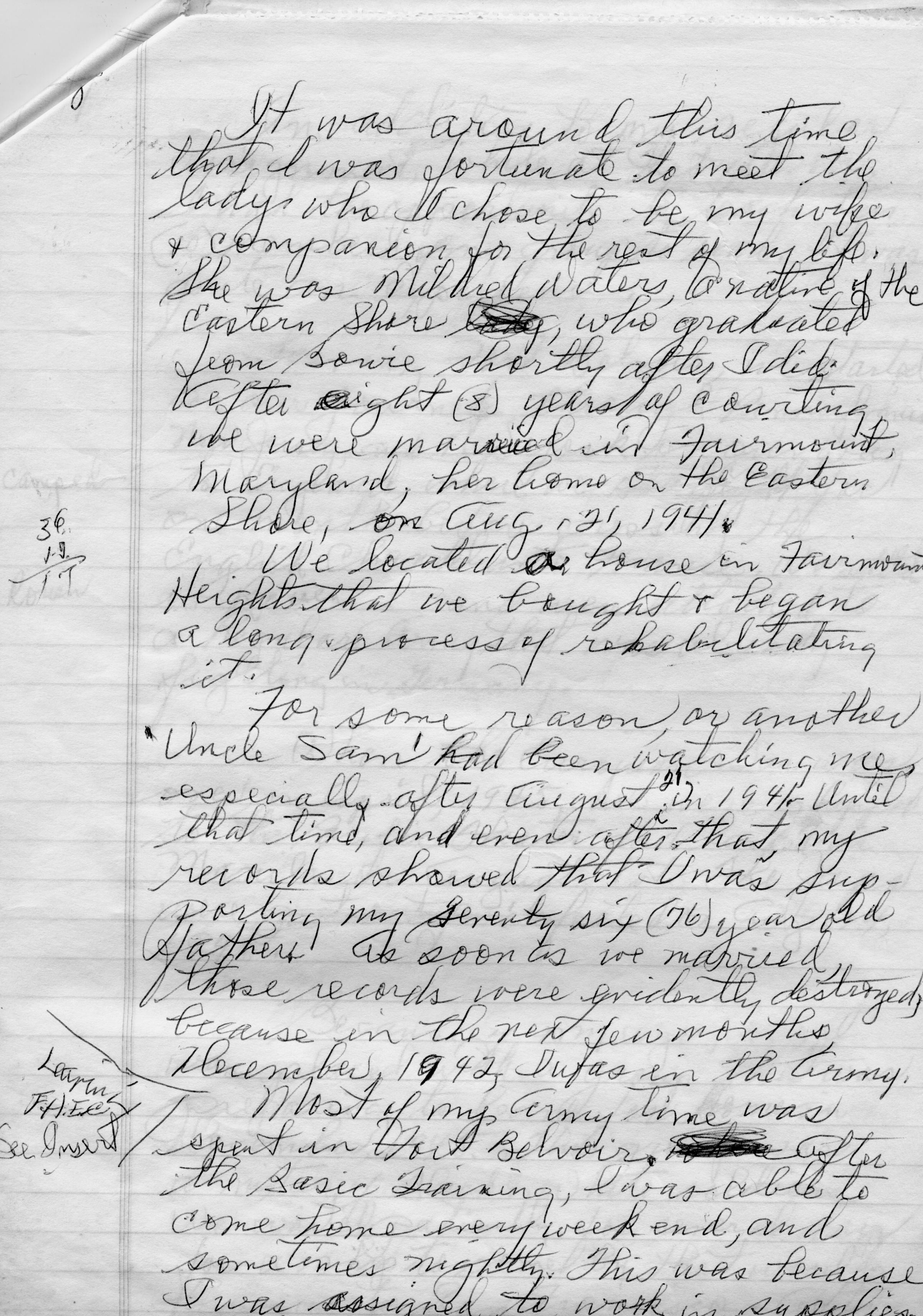
Written by Robert Ridgely Gray
This interview was conducted with Dorothy Holman. It appears to have been done in two parts on the same day. The interview begins with Ms. Holman answering basic questions about her personal and family life. She was born on 12/24, in Lakeland, at home with the aid of a midwife. She was married twice and has one daughter. Ms. Holman describes some of the activities she has been involved with at her church and how the activities she participates in have changed as she has aged. YPD Clean Church Sunday School Missionary Work Cooking Ms. Holman talks about loss in her family and accomplishment of raising children. Children, grandchildren, and great-grandchildren. Ms. Holman elaborated on the role of religion in her and her family's lives. Everybody is human. Ms. Holman described the effects urban renewal has had on the Lakeland community. People leaving the neighborhood and not returning. Hasn't really harmed. Students moving in. Ms. Holman talks about living in her home. 70 years Left for two years during the War. Changes after World War II. Coming of the flooding. Current issues with students and parking. Meeting with Mayor and City Council. Ms. Holman then discussed her childhood memories. Snow days and ice skating on the lakes. Church activities including preaching, studying the Bible, and getting to know people. Everybody is human. Her family all lived nearby, including an aunt that helped take care of her and her siblings and her older cousins. Close community, neighbors would discipline you, no crime or fighting even in school. Family vacations to the beach near Annapolis. Ms. Holman describes gathering places for the community including the Beer Garden and Hall. Places are now torn down. Activities included dances and movies. Elks Club held dances. Ms. Holman describes her family life and the issues she and her family members are dealing with as they age. Her sister is in assisted living, because of Alzheimer's disease. Your mind leaves you. Mother raised her cousin and they remain close. Rely on young people and neighbors to drive her. At this point the interviewers attempt to wrap up the interview. Ms. Holman continues and shares more information about her family and aging. Parents passing. Father had brain cancer. Continues to talk about sister in assisted living. Lives with niece and nephew. Loneliness. No more Sunday dinners. The tape seems to shut off at this point and then to get turned back on in the middle of a conversation. In this part, Ms. Holman is discussing her house. Her father was able to buy the house for $2,000 by working at the University by waiting on tables. A white man named Mr. Watkins built the house. You get the land, I'll build you a house. Lived there approximately 70 years.
A conversation with Violetta Sharps Jones on her experiences growing up and going to school in Lakeland during segregation. Quotes: "All of the teachers were amazing the teachers, at the Lakeland schools, made sure every student was educated." "I always appreciated the words of encouragement I got from neighbors." " The Lakeland community was close knit family." "Everyone in the Lakeland community knew and looked out for one another." "Even though Lakeland students faced segregation and desegregation, it never hindered their educational and family values." Recorded in Ms. Jones' home in Bowie, MD.
Mr. Jacobs arrived in CP in 1972 UR had already started by the time he was elected to the city council The contract with Weiner divided up LL and was mostly his by contract Weiner stalled on building after the infrastructure had be in place CP council wanted $5,700 per house from Weiner Weiner tried to void the contract several times The senior center was built first, then the high rise and the thirdly the town houses East side could not be used for housing because of the flood plain WMATA and CP disagreed on where to put a station CP voted in 1976 to reject a metro station Mr. Jacobs then breaks down how the metro line was built through Lakeland, using soil from lake Artemisia (expanding the lake) to raise the metro tracks, Dervy Lomax is mentioned. The final development of UR was the community center The funding for the community center came from the fact that a sentence was piggybacked on a bill in congress to forgive CP's debt to the federal government Student housing qualified LL for urban renewal, in that student salaries lowered the average income to qualify for urban renewal funds Lakeland residents were given right of first refusal, which was uncommon in UR across the country Each tract of land had height restrictions that Mr. Weiner was developing on LL civic association met quarterly and councilmen regularly attended UM was guilty of persuading UR by association Leonard Smith was a community watchdog of UR CP officials viewed the tunnel as an improvement UM architecture department may have had early input in UR but none when he arrived The purpose of the high rise housing was to take pressure off of rented single family housing in CP, this did happen as they intended Mr. Weiner stalled because he was waiting for a better economic climate This interview was recorded over the telephone.
In the 'LCHP Misc' folder on the hard drive of data from Mary Sies. The interviewer does not state her name on the video, is not visible, and there is no date given.
An oral history interview conducted with Audrey Scott during Lakeland Heritage Weekend 2007.
This interview of Dervy Lomax by Neil Cohen is one of two interviews Mr. Lomax has given as part of the Lakeland Community Heritage Project's oral history archive. The interview is broken into two parts: basic biographical data about himself and his family and the impact living in Lakeland has had upon him, personally. Dervy Lomax was born December 20, 1923 in Berwyn. He became a part of the Lakeland community when he came to Lakeland for elementary school. Mr. Lomax recalls the community watching out for his wellbeing, when neighbors told his parents of his misadventures with a well/spring in an empty field on his route to school. Dervy Lomax married a woman named Thelma in 1953 at First Baptist Church in College Park. They remain married at the time of the interview. Mr. Lomax recalls competing for Thelma's hand with a man who would be the best man at Thelma and Dervy's wedding. When she felt he was taking too much time to propose, an aunt pressured him not to be too choosy or to wait too long. The couple has two sons, Gregory Lomax, born March 6, 1954 and Elson Lomax, born November 28, 1956. Mr. Lomax's parents were Etelka Johnson and Charles Lomax, both born in 1902. Etelka was born and lived in Lakeland all her life. Her parents were Blanche and Charles Johnson, of Bladensburg and Lakeland, respectively. Charles Lomax was born in Muirkirk and grew up in Berwyn Heights. His mother was Henrietta Lomax and she and her husband lived in Muirkirk. As a member of the Lakeland Community, Mr. Lomax was involved with the E.L.K.S. and American Legion, as well as being President of the County Boys Club and Serving on the City Boys Club. He is also a long-standing member of the First Baptist Church of College Park. During high school Dervy Lomax was a pitcher on the school baseball team. When he joined the Navy after graduating from high school, Mr. Lomax continued to play. Once he returned to Lakeland, he joined the community baseball team and recalls his time playing as some of the happiest times in the community. He was so talented and loved by the community that he remembers being urged to pitch in games when he was not even scheduled to play. Mr. Lomax remembers some of his most disappointing times as a member of the Lakeland community as being connected to his involvement in local politics. Starting in 1956, just after he returned from the Navy, Mr. Lomax joined Mary (Williams) Holloman in addressing the City Council about the cost of blacktop on Navahoe Street. Mr. Lomax (who was acting as spokesman for Lakeland) was asked if he was a registered voter and, because of his recent service, he was not, so his concerns were not heard by the Council. He ran for Council in 1957 and was elected. During his time serving on the council, Mr. Lomax emphasizes that he demanded respect and gave respect to his peers in return. Despite respecting one another, the Council continued to avoid addressing his concerns through their votes, whenever possible. The proudest accomplishments in Dervy Lomax's life both centered around education of Lakeland youth. First, he played a large part in getting a school in Lakeland after the old school was earmarked as a school for slow learners, a tactic often employed to remove schools for colored children. Committees of black communities were organized along the Route 1 corridor to discuss where the new school should be built, but the school board also held a non-disclosed, whites only meeting in which they decided to build the new school in Berwyn. Because Mr. Lomax was informed of this meeting by his white friends, he was able to address the school board about their misconduct when they held the official meeting in which all communities were present. As a result, the Superintendent of schools agreed that the school should be in Lakeland. Mr. Lomax also appealed to the State Board of Education for integrated schools while his oldest son was entering high school. During the appeal, colored students were being bussed to Fairmont Heights School from College Park, but Gregory was taught by a private tutor, in order to keep his education on track without compromising Mr. Lomax's appeal. The Lomax's won the appeal and Gregory was allowed to choose between Fairmont and College Park High Schools the following year. He attended College Park. The interview continues with Dervy Lomax addressing various influences in his life. He starts by sharing that religion allowed him to successfully work with the public without being negatively influenced by the lack of personal respect that often accompanied his interactions. For example, when Mr. Lomax was successful in petitioning for code enforcement in Lakeland, many of the landlords in Lakeland were unhappy with him. His faith allowed him to grapple with the dilemmas of doing what was best for his community even when members of his community were unhappy with him. Religion also allowed him to overcome the dishonesty he encountered on the City Council. Finally, religion played a role in his ability to deal with Urban Renewal. A further discussion of Urban Renewal in Lakeland will be available in a later interview, according to this recording. Dervy Lomax was also influenced by two important people in his life. Charles Johnson, his grandfather, was a politically oriented person who kept track of current events. Mr. Lomax spent time discussing these events with his grandfather and even listened to the bombing of Pearl Harbor, live on the radio, with Mr. Johnson. From this relationship, Mr. Lomax developed an interest in politics. Mr. Lomax's mother imparted on him the belief that education was important. He attributes his beliefs, "you have to be educated to do something in this world" and "If you don't have nothing up in your head, you don't have nothing in your pocket" to his mother. The subject of Urban Renewal in Lakeland is revisited again, briefly, as being the event to have caused the most significant change in the community. Mr. Lomax expresses disappointment that many families did not return to live in the new houses that were built after Urban Renewal, despite the input they had in the rebuilding process. He also expresses regret that older members of the community are now selling their homes to owners who rent them to college students. Students do not respect the community and the community is deteriorating as a result. The most important events to impact Dervy Lomax's life are his marriage of 54 years and raising his two sons. He wishes his sons would marry and run for office, following in his footsteps. He also wishes for grandchildren. When asked about special childhood memories, Mr. Lomax returns to his memories of sports in the community. During his childhood, Lakeland was divided geographically, into the Southwest, Railroad Bulldogs, and Babyland areas of the community. Teams would form according to these divisions to play all sorts of games (football, baseball, horseshoes, etc). Mr. Lomax also fondly recalls lawn parties being held by local churches and lakes freezing during the winter and being used as skating rinks for the community and the university students. Those same lakes were used for swimming during the summer. At the close of the interview, Dervy Lomax states that he hopes the community will remember him as dedicated to Lakeland and that he will continue to fight for them as long as I have breath in my body".
In the 'LCHP Misc' folder on the hard drive of data from Mary Sies. The interviewer does not state her name on the video, is not visible, and there is no date given.
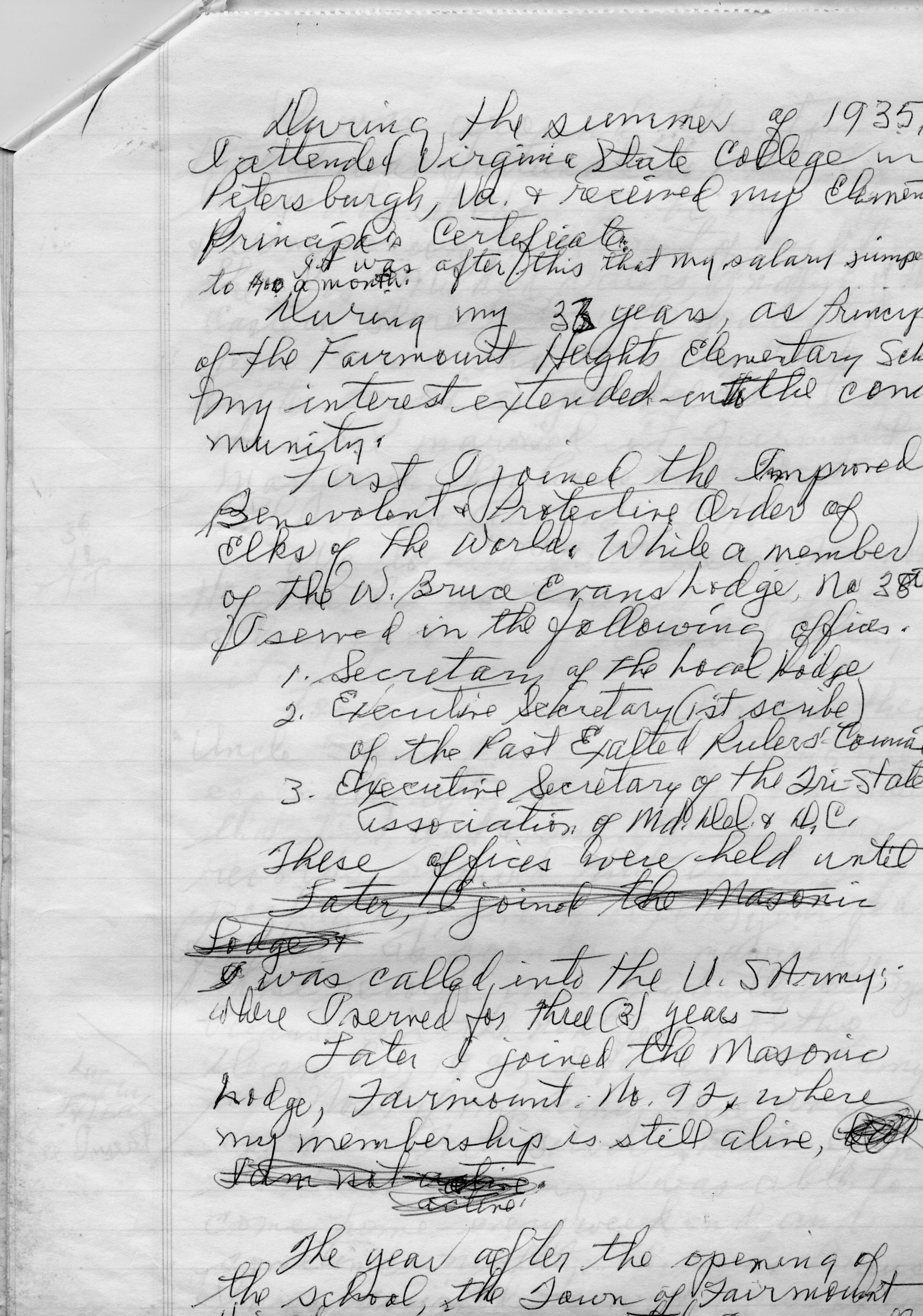
Hand written memories of Robert Ridgley Gray
An oral history interview conducted with Diane Ligon during Lakeland Heritage Weekend 2007.
A conversation with mother and daughter at their home in Lakeland, on their experiences with education and segregation while living in Lakeland. Themes and Quotes from the interview: "There is value in education and it was never an option to go to college, it was an expectation." Almost like home schooling~ Wilmer Gross "There was special care put into each student at Lakeland elementary school to ensure they had a strong understanding of the basics information needed to be successful in secondary school." "You would work and most likely for the University of Maryland"~ Delphine Gross Lakeland is related through blood, marriage, and church families~ Wilma Gross: Teachers would have their own children in their class, go to church with their students, and know their students extended families. Homecoming was a celebration held by the church and was seen as a family affair where the entire community would get together and reminisce. Students from Lakeland excelled in the classroom post desegregation and for this reason they were occasional the subject of bullying. Changes to the feeling of community after urban renewal. People grow up, getting married, and leave the community because there is limited housing. When outside families move into Lakeland, it is difficult to engage them in community activities.
An oral history interview conducted with Dervy Lomax by Eli Pousson as part of an IMPART funded oral history research project.
This is an interview conducted during Maryland Day, 2011, at Cole Fieldhouse. The interviewees answer questions on topics of sports in Lakeland, segregation outside of the community, bussing and integration of the school system, Lakeland's interaction with the University of Maryland, and raising children within the community.
2 parts 1st part 3:38 minutes 2nd part 1:10:02 hours Mr. James Edwards lived on the eastside on lot 10, block 38 Full notes on the interview are attached. Finders guide coming soon! Full notes contain parts of meeting that were not recorded.
Topics Discussed: Family Childhood Employment (His Parents & His Own) Education Activities/ Entertainment (Ice-skating, Carr's Beach) Sports: Baseball Underground Economies- Selling Lily Pads People: Paul Parker/ Parker family Urban Renewal Train Crash into Lake Artemesia
In the 'LCHP-II, Jan 2011 > 15September_audio' folder on the hard drive of data from Mary Sies. The interviewer does not state her name on the audio, and there is no date given. Split across four video files (both mp3 and wma): A-011_1 (3:35), A-011_2 (:13), A-011_3 (43:29), and A-011_4 (3:51)
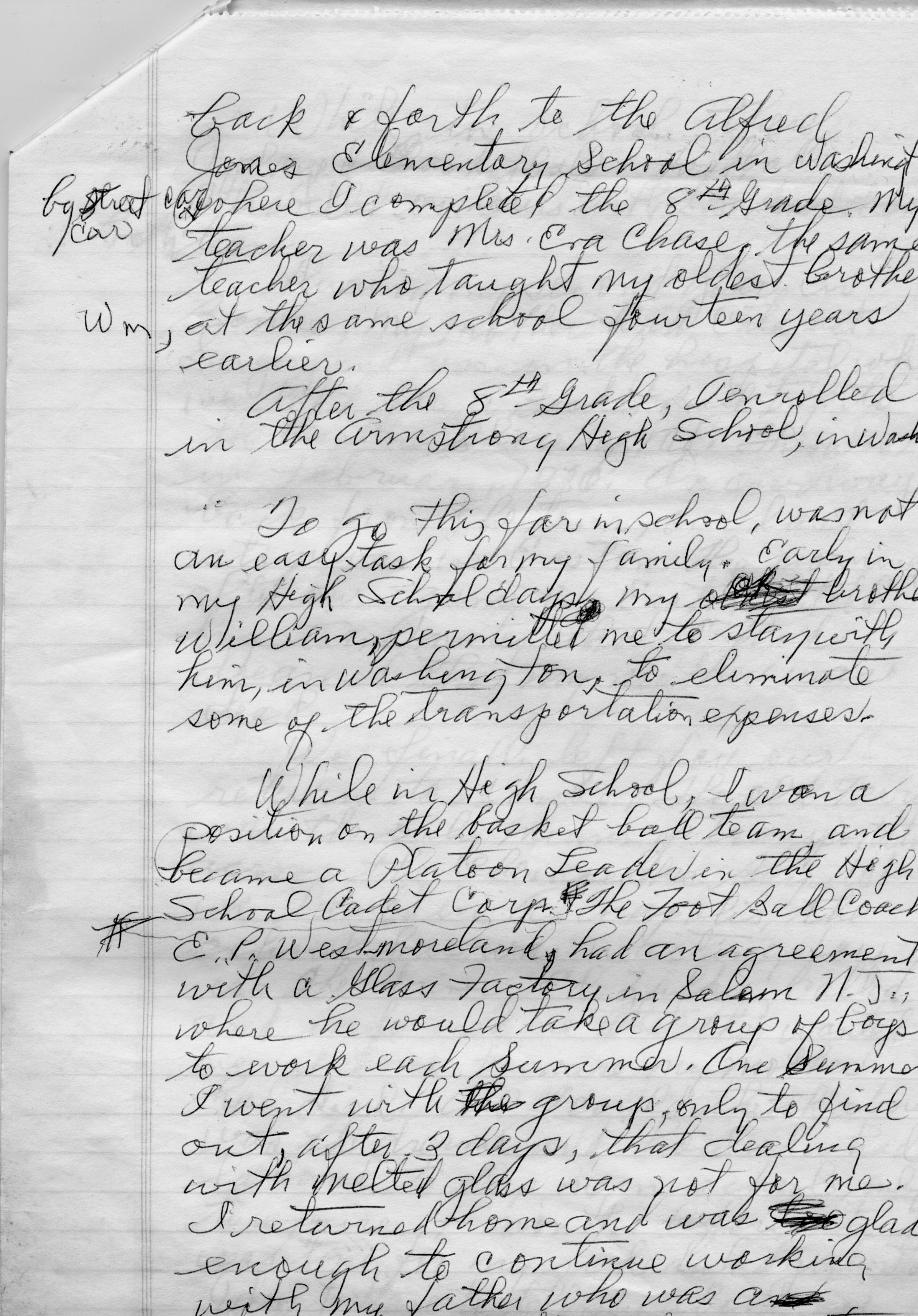
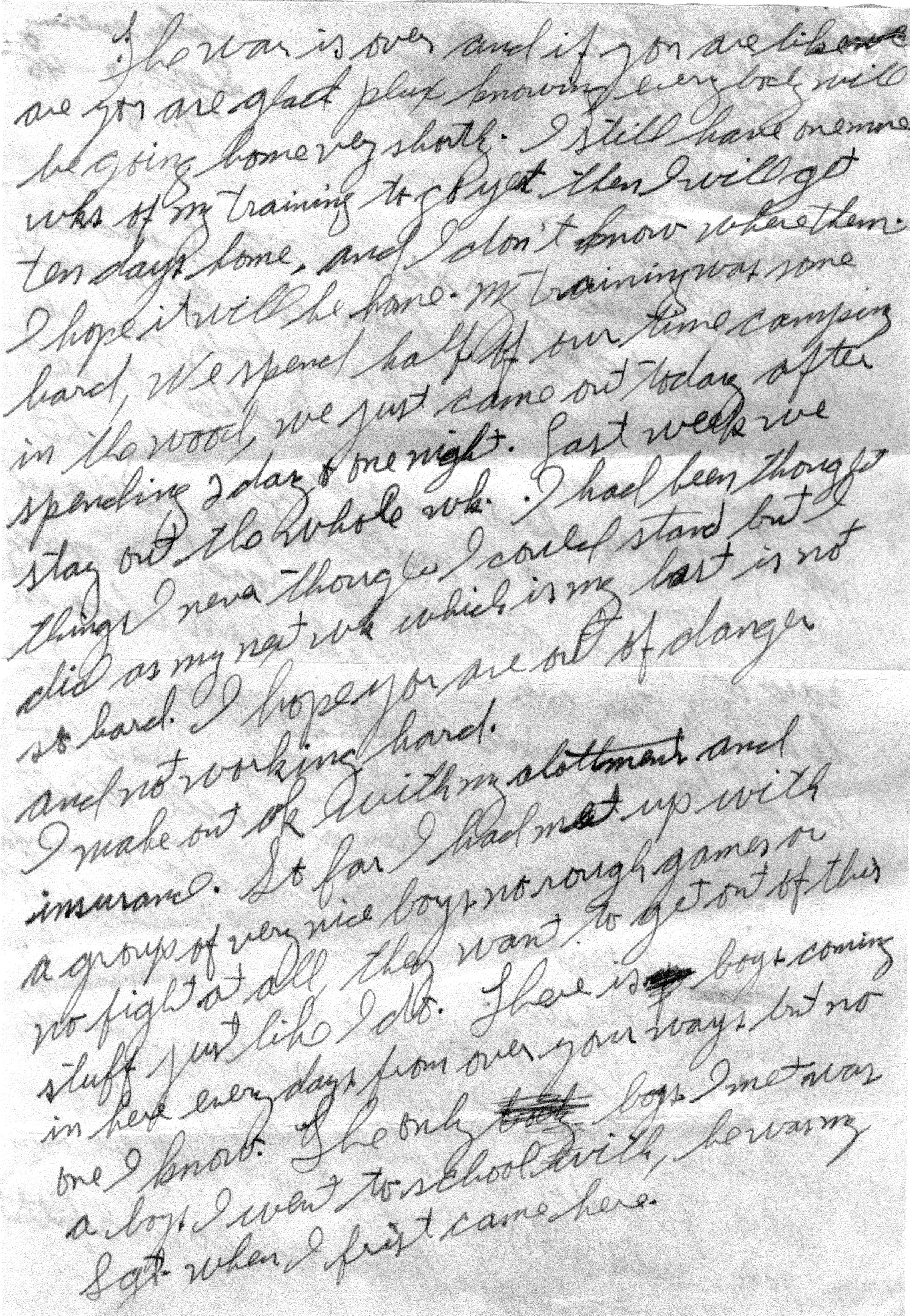
Robert R. Gray
Recorded during Lakeland Storytellers Maryland Day at Cole Fieldhouse at University of Maryland.
An oral history interview conducted with Leonard Smith in his home, by Eli Pousson as part of an IMPART funded oral history research project.
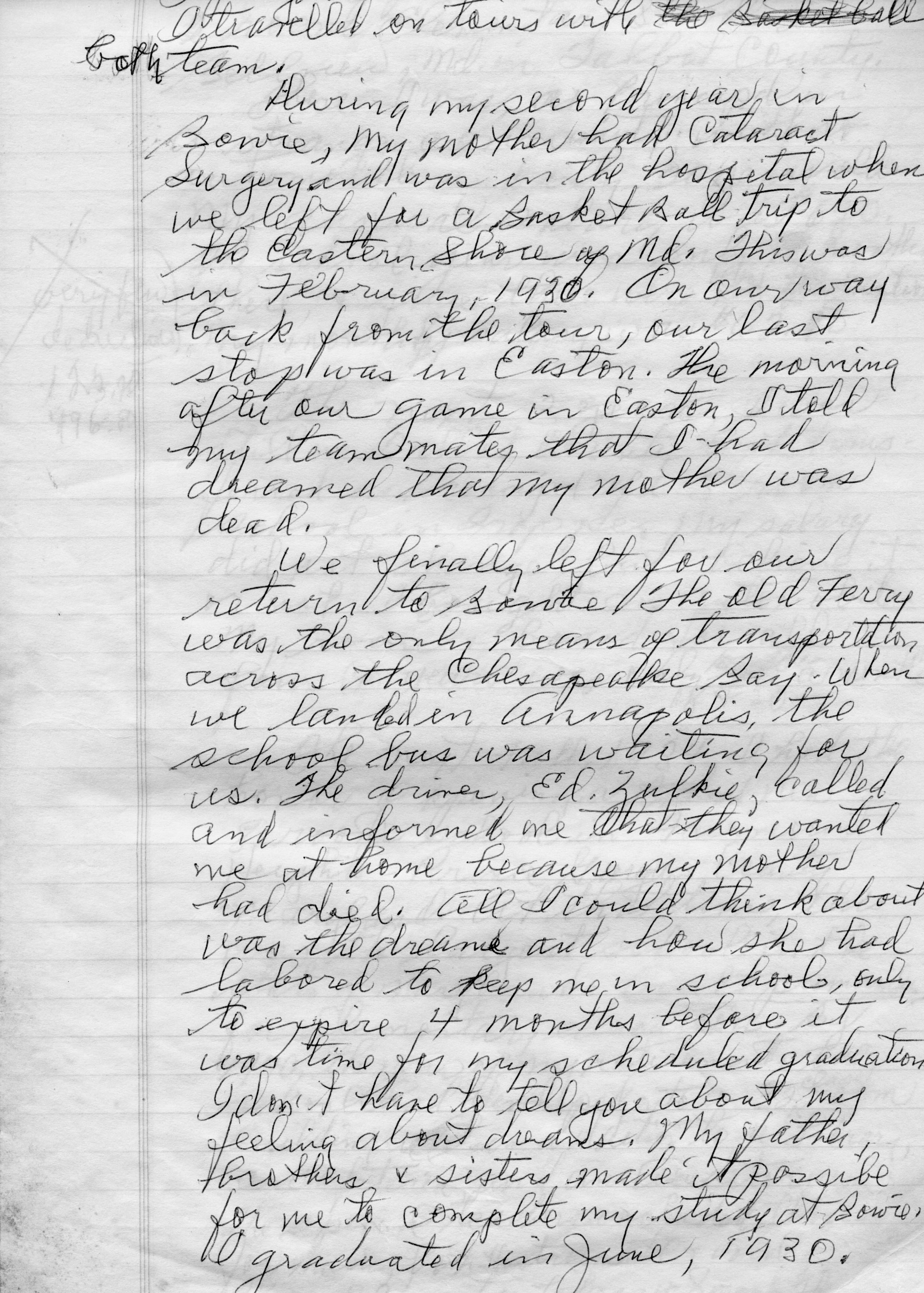
Robert Ridgely Gray
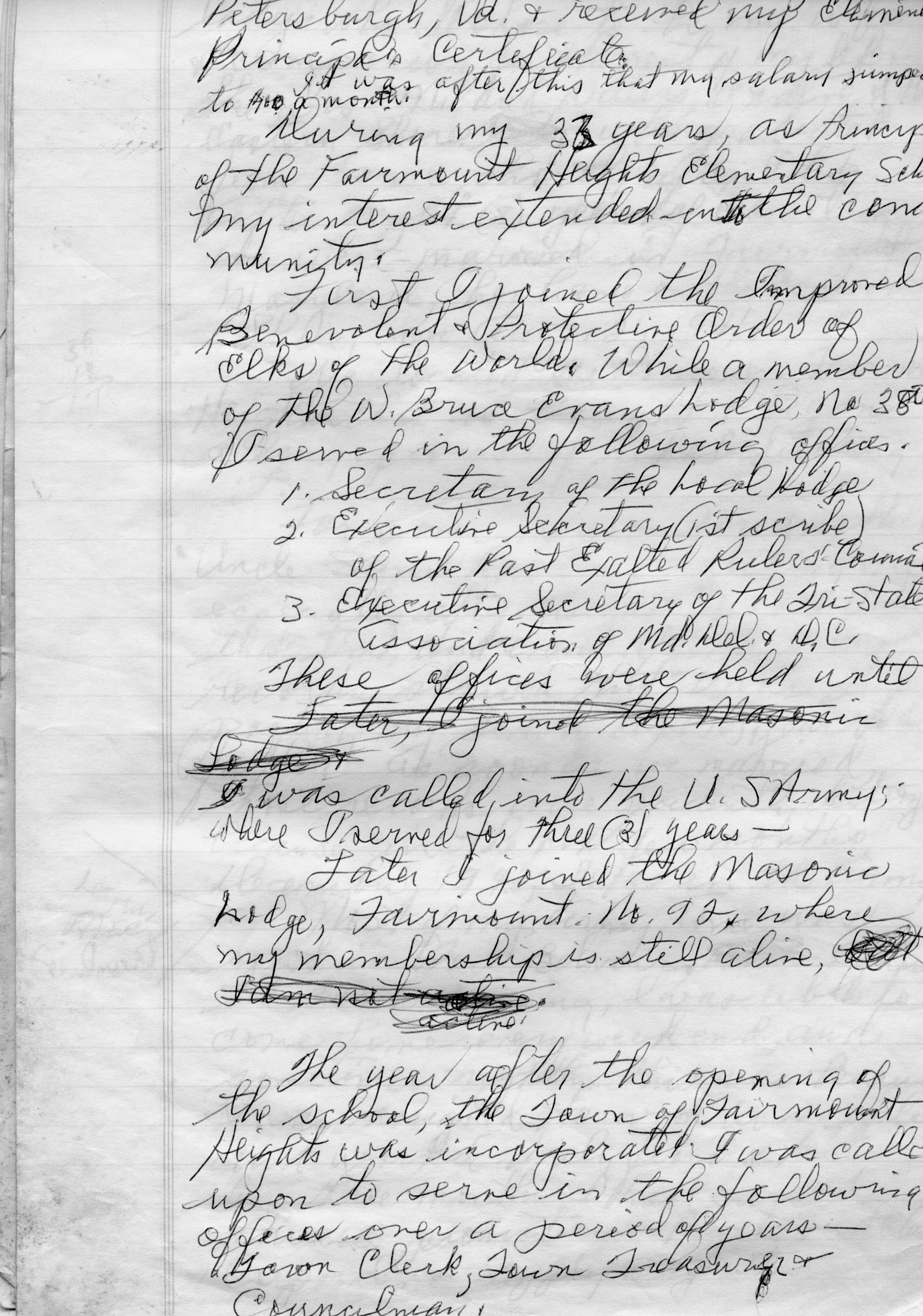
Robert Ridgley Gray
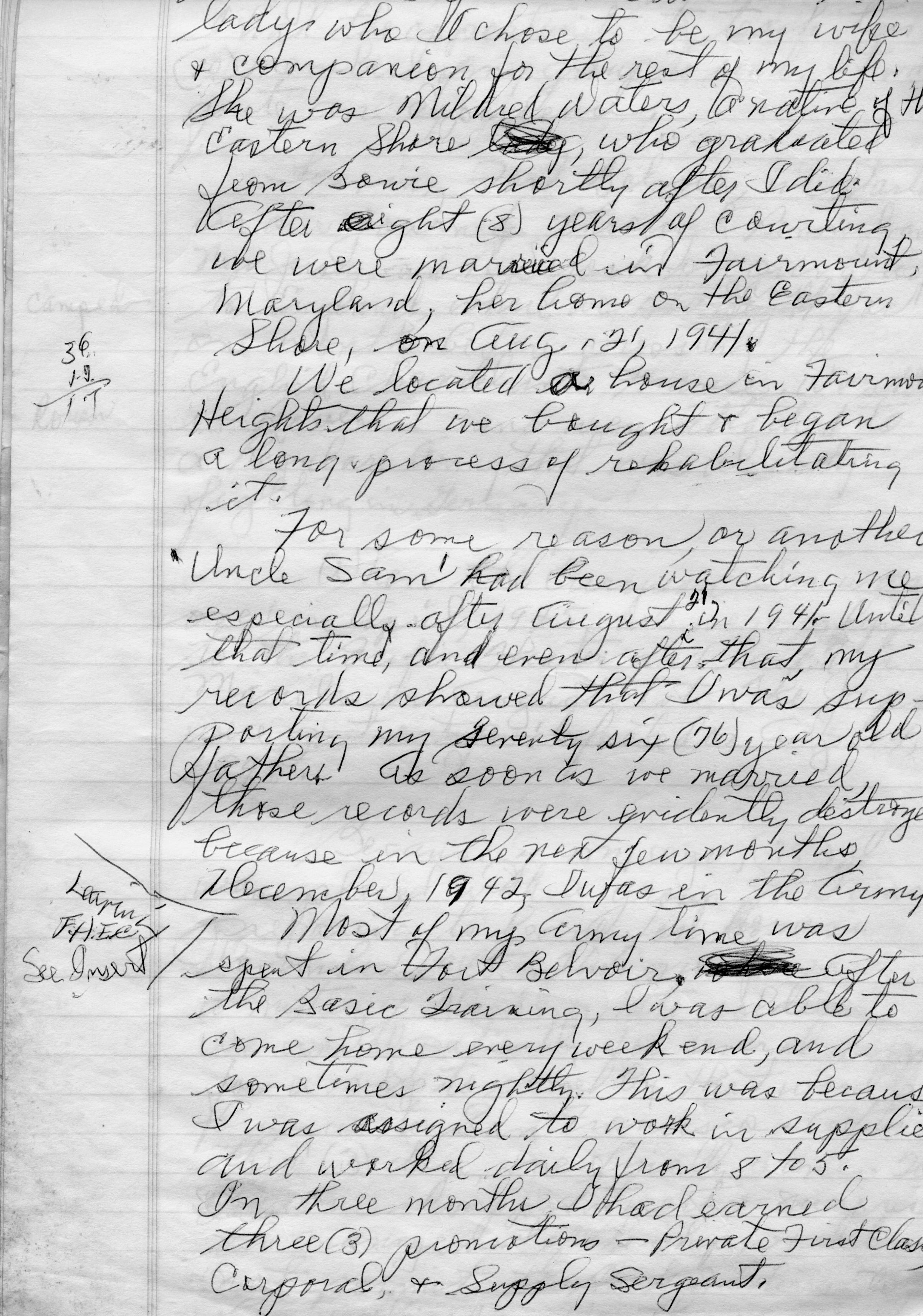
An oral history interview conducted with Betty Thomas Greene by Sandy Tyler following the 2002 oral history workshop.
An oral history interview conducted with Mrs.Mary Hollomand by Eli Pousson as part of an IMPART funded oral history research project.
Interviewer doesn't state her name in the audio recording. Only Kevin Kelly states his full name, there is also a 'Dave' on the recording. Date of interview taken from file metadata, may not be accurate.
An oral history interview conducted with Jeanette Brooks during Lakeland Heritage Weekend 2007.
An oral history interview conducted with Jerome Anzulovic during Lakeland Heritage Weekend 2007.
An oral history interview conducted with Elizabeth Adams at her home during Lakeland Heritage Weekend 2007. She lives in Lakeland. Her grandparents and mother moved to Maryland from Washington, DC. She was born on August 4, 1927. Elizabeth was married twice, first to Maseo Campbell in 1944, who moved to Lakeland from upper Marlboro, and again in 1975 to James Adams, whom she met in Lakeland. Elizabeth recalled the dates of her children. At first she mentioned "four girls and two boys," but five daughters are named. All seven of her children were from the first marriage: Pearl Lee, born in 1943 Bertha, born in 1945 Mary Ann, born in 1947 Maseo, born in 1948 Kathleeen Elizabeth, born in 1950 Dennis W. and Jennifer Lorraine Her mother, Ethel Hicks, was a resident of Washington, DC at the time of Elizabeth's birth. She had remarried Benjamin Waites, the stepfather to Elizabeth. Elizabeth made no mention of her natural father. Elizabeth's most vivid memory is of her grandmother, Annie Hicks of Merrifield, VA. Grandma Hicks, as she is remembered, largely raised the young Elizabeth while her mother worked. Elizabeth's maternal grandfather, Benjamin Hicks, came from Calvert County, MD. Although Elizabeth has played an active role in the Lakeland Community Heritage Project, she did not go into much detail about her activities with the organization. She is a proud and active member of Embry AME Church and knows the Reverend quite well. She takes part in Martin Luther King memorial celebrations each year and belongs to the Laity Organization. Her fondest memories are of family picnics with everyone together. Her worst memory was of the torrential flood that hit Lakeland in the 1950s. Maseo had passed on and Elizabeth was alone with three children. She described the waters rushing through the streets. At one point she recalls that it looked like the four of them would have to climb onto the roof for safety. The house had no basement, so water gushed through the windows and doors, quickly filling the rooms. Elizabeth was proud of the fact that she had lived in the same house all her years at Lakeland. In 1947, shortly after their wedding, Maseo gave up his trailer and built a home on the same lot along Navahoe Street. When asked of her proudest accomplishment, Elizabeth pointed to her position for seventeen years at Albright's Pharmacy, formerly on College Avenue in College Park. She noted how gratifying it was to see houses remodelled and to watch the Lakeland community grow in numbers over the years. Not all the changes to Lakeland, however, were welcome. She regrets how streets had changed - in many cases, not just their names. She mentioned a group of townhouses and community center rising where there had once been private homes. She speaks with deep pride about the James Adams Park, which the mayor named in honor of her deceased husband, who was very active in the Civic Association of Lakeland. As for most Lakelanders, religion has played a pivotal role in Elizabeth's life. She often pariticpates in church programs and loves the new minister, Reverend Jenkins. Grandma Annie had the greatest formative influence on Elizabeth during her adolescence. Elizabeth remembers her as a "wonderful person who always encouraged me to do the right thing." Sunday meals were a focal point for the family, and Grandma would teach Elizabeth the finer points of baking biscuits and cakes, especially as she came into her teens. Elizabeth enjoyed such sports as croquet, volley ball, baseball and roller-skating. As a child, she played dodge ball, hopscotch and hide-and-seek. When it snowed, she would belly-wop on a sleigh or toboggan. Her favorite toys were paper dolls and, as the family could afford it, especially teddy bears. One memory that stuck with Elizabeth was the crossing of the train tracks. So many of her contemporaries were now dead, but she remembers some of them moving across the tracks to the other side of Lakeland, presumably from east to west, as the community became incorporated into College Park. Oddly, as Elizabeth recalled the games she played as a child, this prompted her memory of learning to drive - at the ripe age of 38 - when Maseo poked poles into the pavement and her nephew made her drive around them. What has accounted for her cheery disposition? What is the source of her happiness? Elizabeth had no simple response. It seems that this was how Grandma Annie had lived her life, and hers was a good model to follow.
An oral history interview conducted with Pamela Boardley by Eli Pousson as part of an IMPART funded oral history research project.
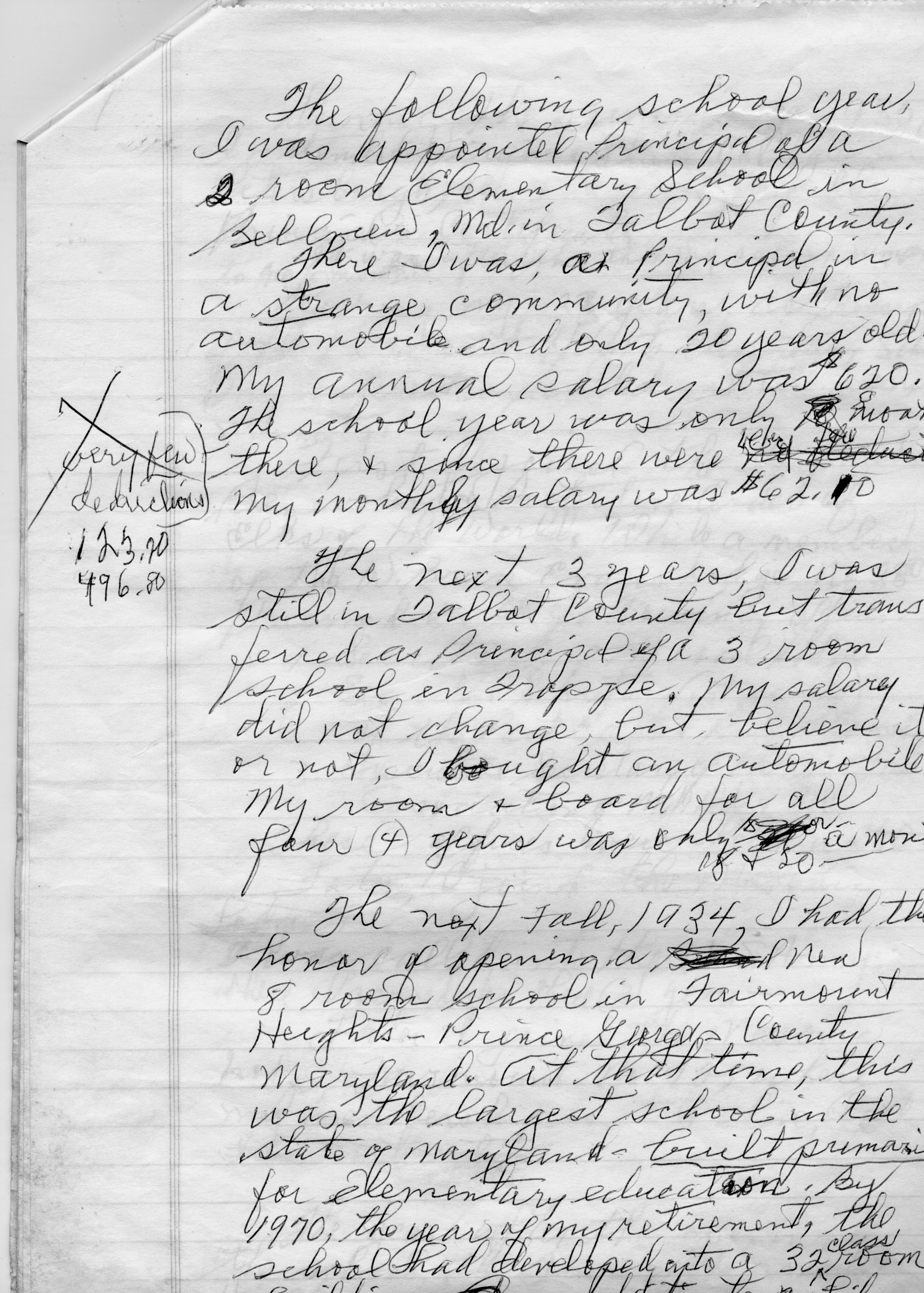
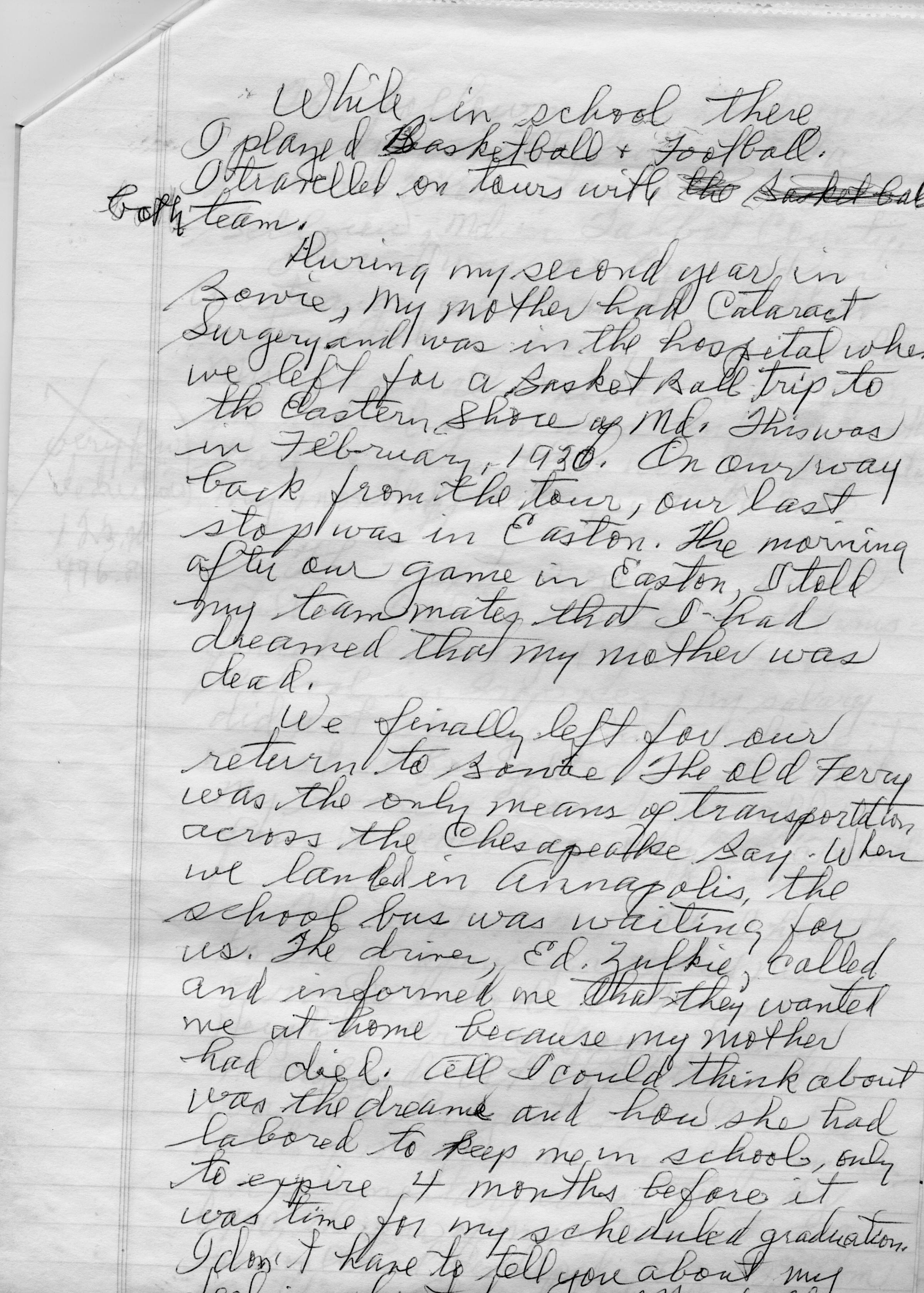
Robert R. Gray
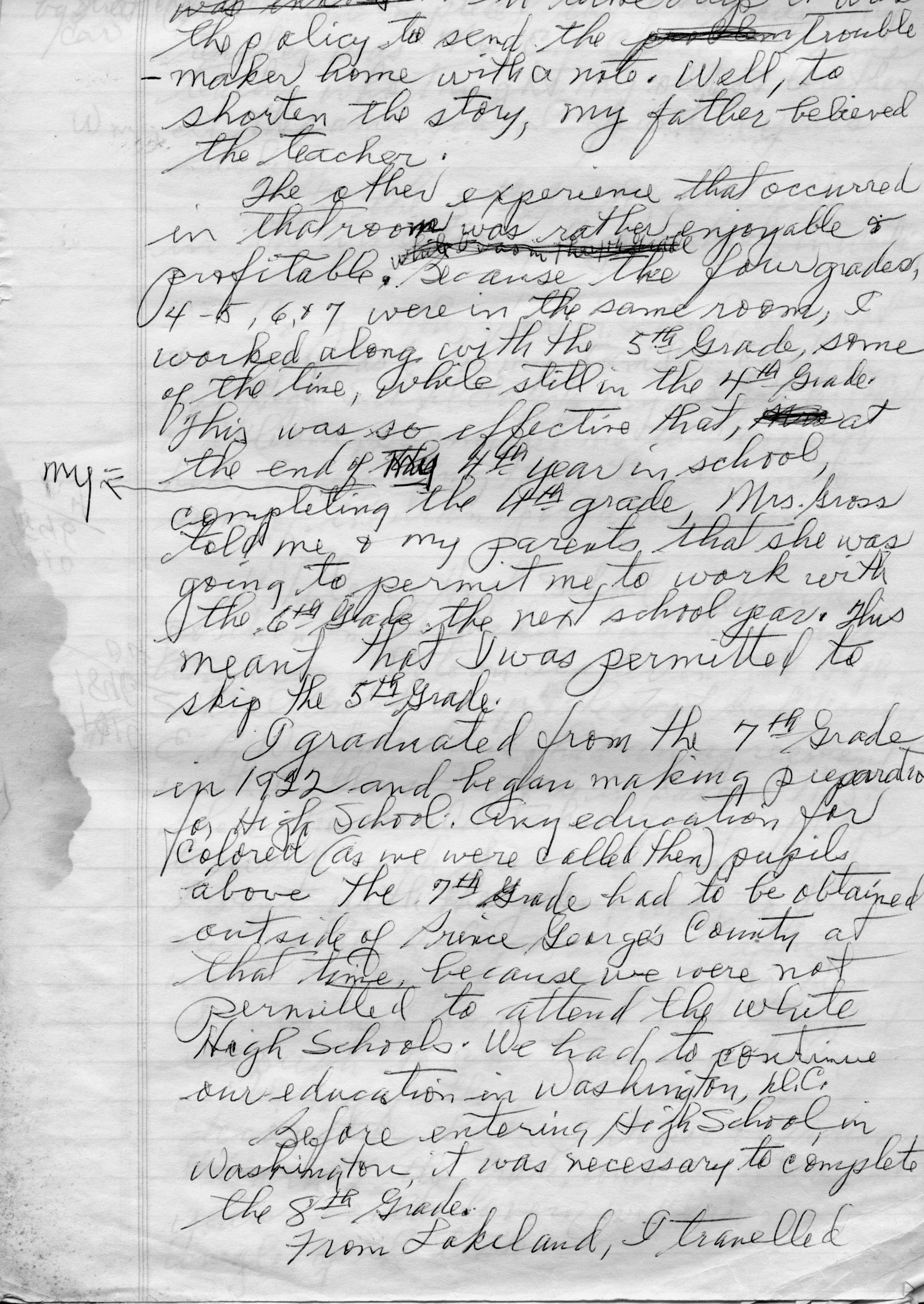
Robert Ridgely Gray